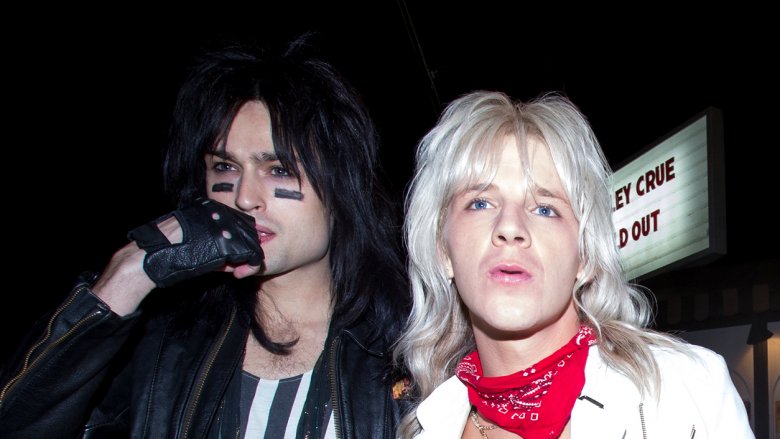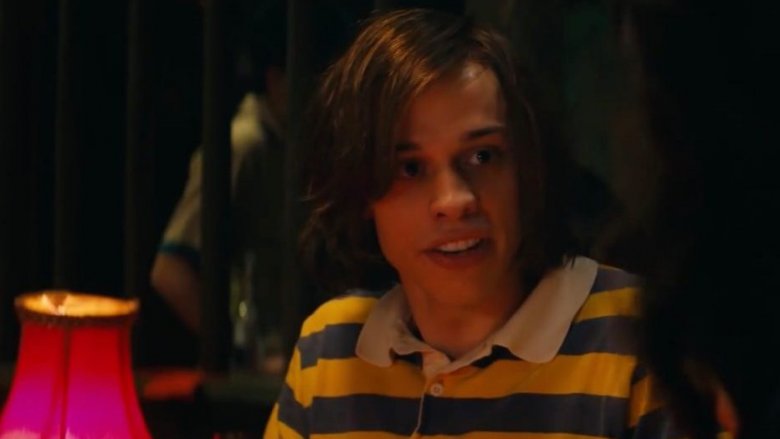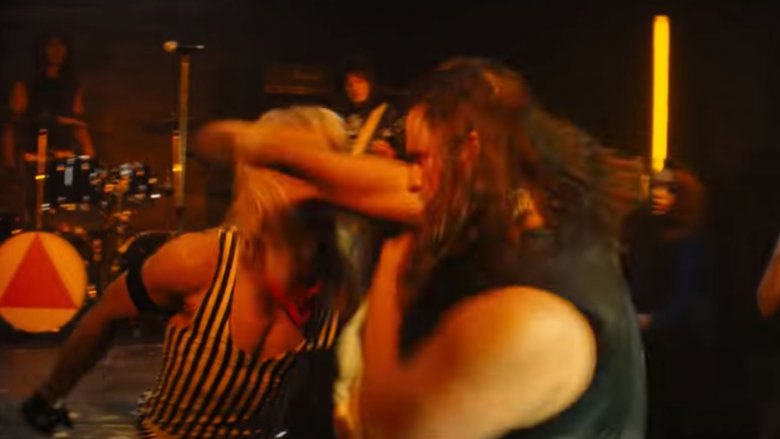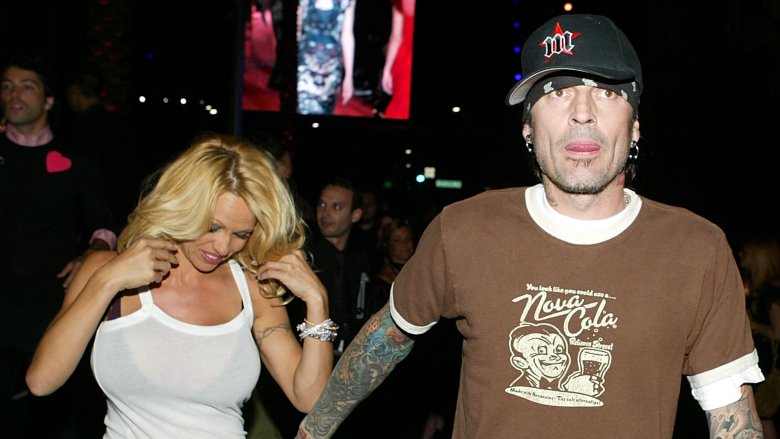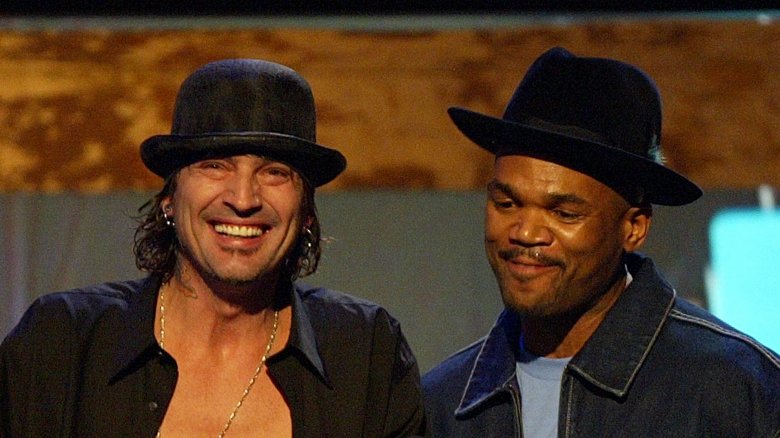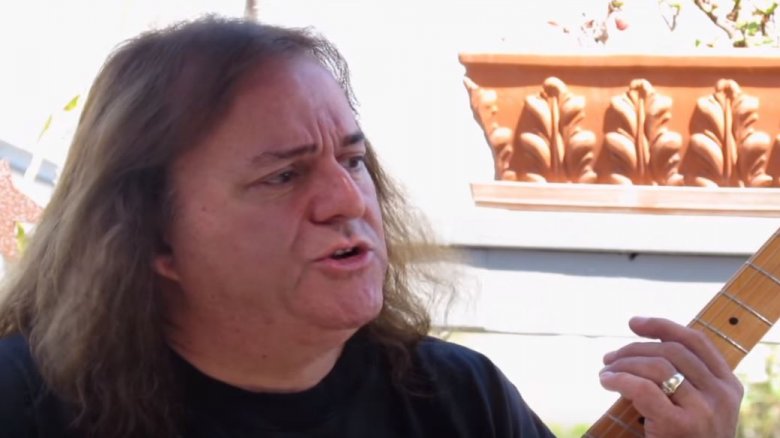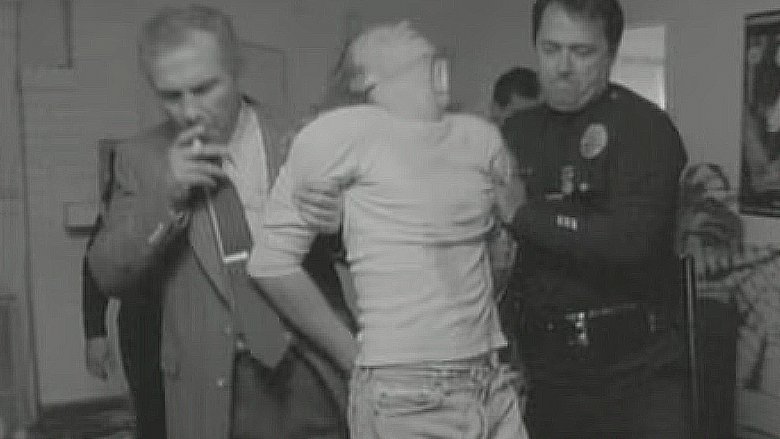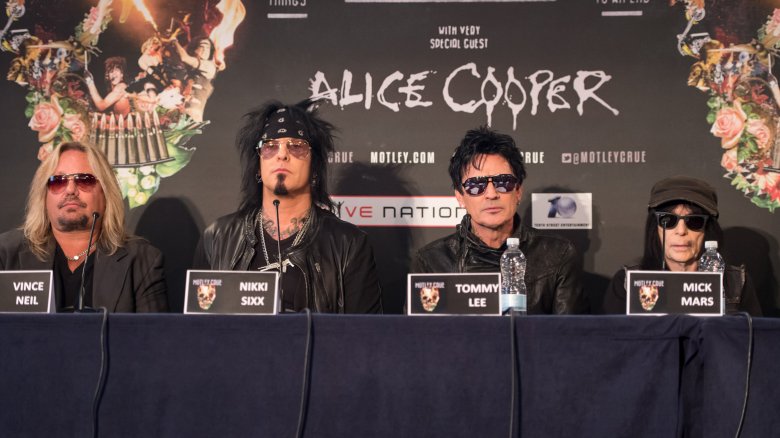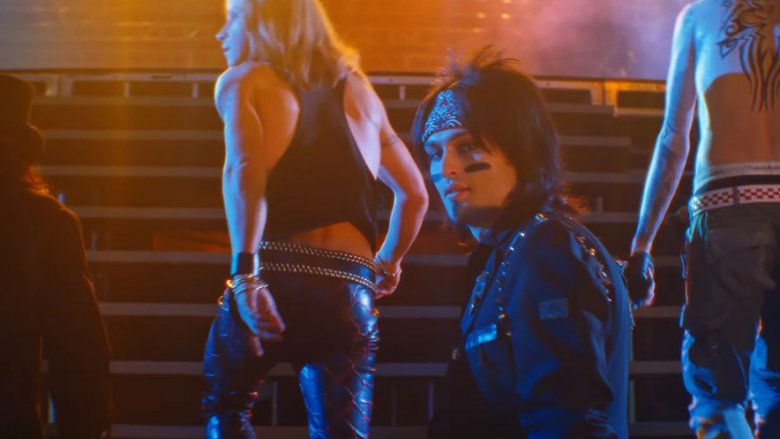How The Dirt Ignored Motley Crue's True Story
In the world of rock biopics that twist facts and gloss over the less PG-13 traits of their subjects (Bohemian Rhapsody, anyone?), Motley Crue's The Dirt is fairly refreshing because it doesn't even bother to hide the fact that it's lying to the viewer. On multiple occasions, members of the band stop the movie to casually inform explain the viewer that a major real-life character has been omitted from the movie or that an event actually happened in a completely different way than the movie leads us to believe. What's more, the film is also based on the band's collective autobiography of the same name, which is notorious for its no-holds-barred look at rock star debauchery.
With a pedigree like this, it's easy to assume the movie is an honest look in the grimy, sticky lives of the self-professed "world's most notorious rock band." Unfortunately, this isn't quite the case. Let's take a look at how The Dirt ignored huge chunks of Motley Crue's true story.
Publishing rights issues
If there's one thing we learned from The Dirt, it's that it's shockingly easy for a rock band to negotiate the rights to their own music. The movie shows us that Tom Zutaut meets Nikki Sixx at a bar and pretty much just informs him that they're giving him back the rights to all of his publishing. While Elektra did hand over the rights in real life as well, it was actually a much more difficult and important event than the movie shows. Alternative Nation tells us that the negotiating parties were the band and Sylvia Rhone at Elektra. Motley Crue's popularity was rapidly dwindling, so Rhone didn't want to pay them the $12 million contractual advance the record company owed them. Manager Allen Kovac describes the deal the band brought to the negotiation table: "Give us $2 million, keep $10 million and Motley will own their masters and copyrights."
The record company agreed to the deal, saved $10 million and managed to offload what to them must have seemed like a dying talent. However, Motley Crue got the last laugh: According to 2019 figures, they have raked in roughly $150 million in royalties. They don't own the rights anymore, though — Nikki Sixx signed their catalog over to Downtown Music Publishing in 2016.
The violent impulses
The Dirt shows Motley Crue fighting during their first concert, and though this is played largely for laughs and depicted as a fair-ish "band vs. hostile crowd" fight, it lays some groundwork for the fact that the band doesn't hesitate to throw a punch — apart from Mick Mars, who remains onstage with his guitar. Later in the movie, drummer Tommy Lee punches a confrontational girlfriend in a tour bus, to which everyone, especially Lee, reacts with dazed shock. All of this makes it seem like The Dirt fearlessly shows the band members' most violent instincts, but in reality, the movie (perhaps wisely) pumps the brakes before showing just how comfortable every Crue crewman (save Mars) has historically been when it comes to hurting other people.
Vince Neil has assaulted women multiple times (allegedly and also definitely), to the point where Nicolas Cage once had to intervene. Tommy Lee was sued for assaulting a photographer in 2013, and as E Online notes, was sentenced to six months in jail for spousal battery in 1998 after a particularly nasty scuffle with Pamela Anderson. Rock Candy Magazine reports that even Nikki Sixx, whose destructive tendencies were mostly aimed at himself (see: The Heroin Diaries), once managed to get himself and his manager arrested when he threw a bottle at a man's head in a bullet train from Osaka to Tokyo.
Pamela, Pamela, Pamela
The most glaring character omission from The Dirt is arguably Pamela Anderson, whose turbulent relationship with drummer Tommy Lee would probably have sparked a lawsuit or nine had it been featured in the movie. Still, while Anderson is noticeably absent from the film, in real life she certainly left her impression on more than one band member — as Vince Neil is happy to tell everyone in his autobiography Tattoos & Tequila, Anderson briefly dated him before she got together with Lee.
Of course, Neil's brief involvement with a pre-fame Anderson was merely an aperitif compared to the vast banquet of celebrity tabloid antics that was the Baywatch star's whirlwind romance with and marriage to Lee. As E Online reports, in just a handful of years they managed to become parents, cement their place as one of (if not the) most followed couples in the world, make constant waves wherever they went, inadvertently become the stars of the most famous celebrity sex tape ever, and fall out so badly that Lee was sentenced to six months in prison for spousal battery. Okay, we totally understand why she wasn't included in The Dirt — these two would have totally hijacked the movie's runtime.
Tommy Lee's weird hip-hop phase
According to MTV News, Tommy Lee found himself in a strange place in 1999. He had started thinking that his glam metal days (and subsequently his Motley Crue career) was over, and he wanted to do something else. That "something else" turned out to be a brand new career in ... uh, hip-hop? He put together a rap-metal act called Methods of Mayhem, and started hobnobbing and collaborating with artists such as Snoop Dogg, Busta Rhymes, Wu-Tang Clan member U-God, and even Limp Bizkit's Fred Durst.
This strange turn in Lee's life was likely omitted from the movie because a plotline where the hardest-rocking rock musician of the group suddenly veers toward hip-hop would have caused undue (though potentially hilarious) confusion. Also, there's the fact that the catalyst for this change was an "I must do something with my life" epiphany during his six-month prison sentence for assaulting Pamela Anderson, so ... yeah, sounds like something Lee might have vetoed from the script pretty early on.
The early adventures of Mick and Nikki
According to The Dirt, guitarist Mick Mars met Nikki Sixx and Tommy Lee for the first time during an audition where he proved to be the man for the job, but the movie ignores the fact that the real Mars and Sixx had met before. However, to be fair, even they didn't realize it at the time. In 1978, Sixx was working at a liquor store when Mars walked in. Loudwire tells us the guitar player had a gig with his band White Horse at a nearby venue called Stone Pony but had snuck away for a bottle of tequila because the Pony's $2 shots were too expensive for his taste. Mars immediately recognized Sixx as a fellow rocker and struck up a discussion, asking what bands the younger man liked. Unfortunately, Sixx's string of answers included KISS, which didn't impress Mars, but the guitarist still invited the kid to White Horse's concert after he clocked out.
After Sixx finished his shift, he got wasted and walked into the bar, only to be greeted by the magnificent sight of Mars grinding out a guitar solo by using a microphone stand as a slide. The highly impressed Sixx hung on until the end, and the two resumed talking. Mars even drunkenly gave Sixx his phone number. However, this chance encounter never led anywhere, though by sheer chance, the guitarist would later join his young drinking buddy's band.
The lost guitarist
The Dirt introduces Mick Mars when the guitarist shows up for an audition, outplays a blond guitarist playing with Nikki Sixx and Tommy Lee, and promptly fires the poor guy when Sixx and Lee can't work up the nerve to do it. As Ultimate Classic Rock reports, there's no proof that this kind of incident ever happened, so it makes sense that the scene was likely included to immediately establish Mars as a detached, cynical veteran.
However, it just so happens that Motley Crue did originally flirt with another guitarist before Mars came along. Said guitar player was Greg Leon, and he was a far cry from the sad sack depicted in the movie. He was a well-known singer and multi-instrumentalist in the Los Angeles hard rock scene, and Lee was a giant fan of his, to the point where the drummer ended up joining his band Suite 19 for a year and a half. In 2017, Leon said that Lee had been courting him for the proto-Motley Crue, but the guitarist was uninterested because of the presence of Sixx — he thought Sixx was a terrible musician. Leon also disliked Nikki's insistence in recruiting a frontman because he was sick of sharing lead vocal duties.
Motley Crue and Leon went their separate ways, but the guitar player didn't exactly fade into obscurity. He became Randy Rhoads' replacement in Quiet Riot, played with Dokken, and has fronted a number of bands of his own.
That time MTV banned them
The Dirt devotes some time to establishing Motley Crue as a group that thinks about their band image pretty carefully (if drunkenly). That's why it's not exactly a surprise the movie doesn't mention the time that they turned in such a miscalculated product it got them banned by MTV. Ultimate Classic Rock describes the sad tale of the band's music video for their 1987 single "You're All I Need." The song had particularly vicious lyrics, and Motley Crue decided to double down in the video, which depicted a doomed, destructive relationship that ends when the man thrashes their home and kills the woman. The video is shot in the matter-of-fact style of news clips, and it did not go over well with MTV executives, who banned it from the channel.
It didn't exactly improve the song's image that Nikki Sixx later admitted that the song's dark lyrics were inspired by his own failing relationship where he became convinced his girlfriend was cheating on him. Sixx says he dealt with the situation by writing this dark song, playing it to his ex-girlfriend, and walking out of the door after she started crying.
Those blinding stage lights
The Dirt presents Motley Crue as a pretty amazing live act, which is why it's hardly surprising the movie ignores the time that their stage show took a nasty turn for one particular fan. As AL.com tells us, in 1985 a 13-year-old fan was partially blinded during a concert in Alabama when something — possibly a chunk of dry ice from malfunctioning equipment — flew into his eye.
Tragic as the accident was, the trial of the case in 1988 was something completely different. As president of the band's business affairs, Nikki Sixx was in town for the duration of the proceedings. His stay was something right out of a "fish out of water" movie: Sixx was fresh off his near-fatal 1987 overdose and had evidently straightened himself out somewhat. Instead of a demonic, outlandish rock star, the locals found a friendly, super-famous, nice guy who hung out at local music joints chatting with small-time cover band musicians and casually offering Lifesaver candies to fans. He even struck up an oddball friendship with a local legal liaison; the Sixx gave the lawyer guitar pointers, and the lawyer taught Sixx how to tie a necktie.
The trial itself was a less casual affair. Though Sixx and the blinded fan were both quite amiable, the proceedings were pretty heated and difficult, and the case ultimately ended in a mistrial. Motley Crue later settled out of court.
John Corabi's role
John Corabi's fate in Motley Crue is that of the classic "new guy" — fans never really warmed up to the new singer, and when Vince Neil returned to the fold Corabi was quietly phased out. The Dirt deems him such an unimportant, forgettable filler piece in Motley Crue lore that we only briefly glimpse him onscreen and he never utters a single word.
As Raw Music TV notes, Corabi's real influence was more than a goofy grin and a commercially failed album — in fact, they argue that the new singer outright saved Motley Crue. When Neil left/was fired in 1992, Motley Crue was trying to follow their most commercially successful album Dr. Feelgood at an impossible hour. Grunge music was rapidly showing hair metal the door, and artists such as Poison and Ratt were quickly finding out that their niche didn't have legs anymore. Corabi ushered in a different style of songwriting and musicianship and forced the band out of their dying comfort zone. While the other band members undermined this new injection of creativity with a bunch of hilariously awful mistakes (like firing their manager, lawyers, and accountants while attempting to produce the record themselves), Corabi was never an issue for them, and they liked him so much they wanted to keep him around despite the 1994 album's lack of success. That is, until Neil returned.
The really, really stupid lawsuits
Netflix's The Dirt doesn't hesitate to show us some of Motley Crue's more ... inspired rock star behavior. Where 1980s action movies have training montages, this film has one that's dedicated entirely to destroying hotel rooms and terrorizing people. The movie has a tendency to treat the motley crew's activities as "boys will be boys" escapades that see little consequence beyond the massive hangover next morning. Really, cop cars only seem to turn up for the real life-and-death stuff — namely, when Vince Neil crashes his car and kills the Hanoi Rocks drummer Razzle.
The thing is, in the real world it's incredibly easy to get in deep trouble for the kind of things the band members have gotten up to. Apart from all the more serious stuff that has landed them in hot water, they have been involved in some absolutely ridiculous lawsuits over their equally ridiculous behavior that has nevertheless hurt people. In 1999, MTV reports they started harassing a security guard so much they almost started a riot. In 2016, Metal Sucks says a supporting band sued them for assorted shenanigans that included members of the Crue entourage spraying urine at them. Yet, when someone actually tries to hit them with some consequences, they can be pretty thin-skinned: In 2005, MTV tells us Motley Crue sued NBC because the network had banned them ... because they had dropped an F-bomb during an NBC Christmas special.
A lot of their memoir might be completely fabricated
The movie The Dirt is, of course, based on the book by the same name, and this dual attack of filthy hard rock stories is arguably the most important reason the world is still interested in Motley Crue instead of, say, Poison or Ratt. Wouldn't it be pretty weird if all that were built on a lie? Not that we're saying it was. In fact, we're not even saying that some of it was. We don't need to, because as Loudwire reports, Nikki Sixx has said it himself.
In 2019, Sixx was in hot water over a story in The Dirt (the book) where he described a party that culminated in him and Tommy Lee committing sexual assault on an unwary woman by fooling her into switching partners mid-act. The bass player defended himself by saying he "does not recall" the story beyond reading it, and also admits that he doesn't remember a lot of his interviews for the book. Sixx says this is because the interviews were conducted in 2000, a year before he went into rehab, and incidentally a year when he was going through a particularly rough patch with his drug and alcohol intake.
Will we ever know? It's one of those times where you kind of hope the person was actually lying, you know?
The disappearing Doug Thaler
To be fair, Motley Crue manager Doug Thaler is technically seen in The Dirt. However, his appearance lasts for a blink of an eye, and while the band admits he's a great guy, they then remove him from the movie so they're both represented by Thaler's co-manager, Doc McGhee. This is actually kind of strange. It's true that McGhee is the more colorful character of the two — just ask Ultimate Classic Rock about that one time he tried to smuggle 40,000 pounds of marijuana into the U.S. However, Classic Bands makes it pretty clear that Thaler was much better suited for the guardian/handler duty the McGhee character served in the movie than the real-life McGhee, who Thaler thinks was a bit too much of a rock star wannabe himself.
Thaler was a successful agent, an award-winning personal manager, and a former musician who played alongside Ronnie James Dio for five years. He crafted his managerial identity to be the kind of manager he felt he would have needed during his musician years, and as a result, he was the guy who was fully prepared to get in the faces of record company executives to get Motley Crue the best possible deals. When McGhee and the band fell out, they even asked Thaler to take over, which he agreed to do for a while.
